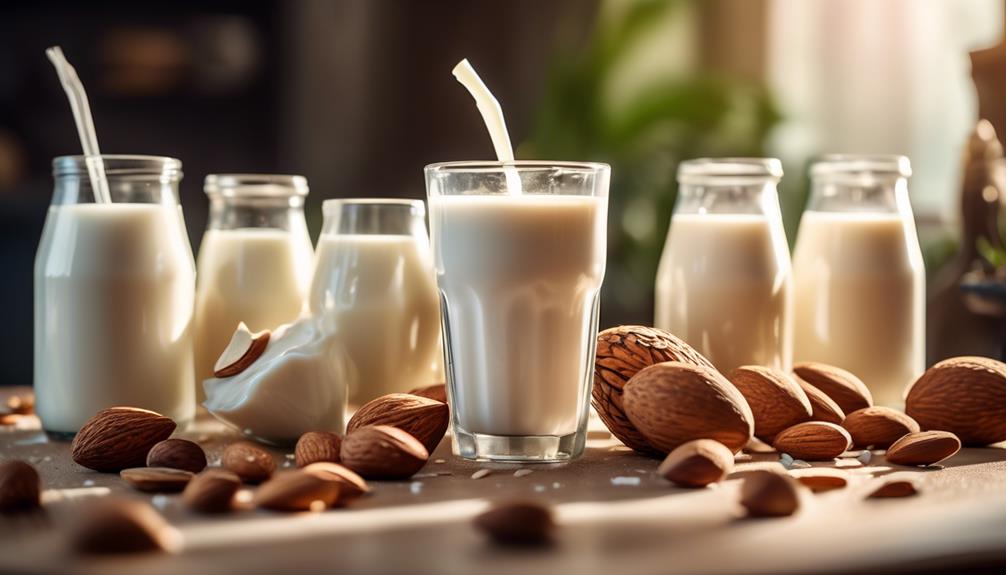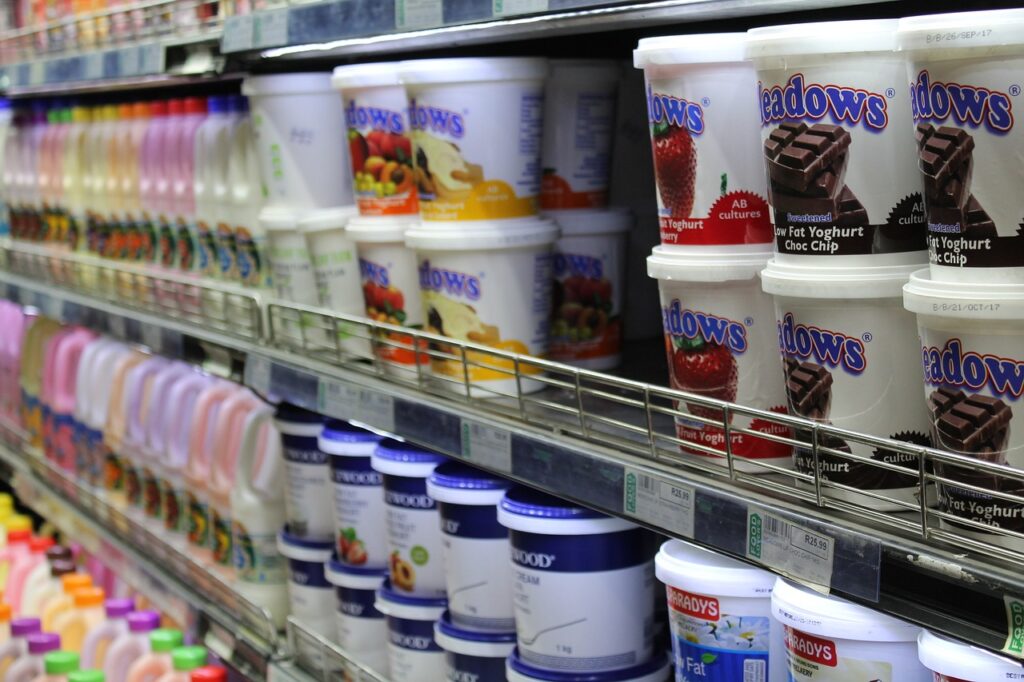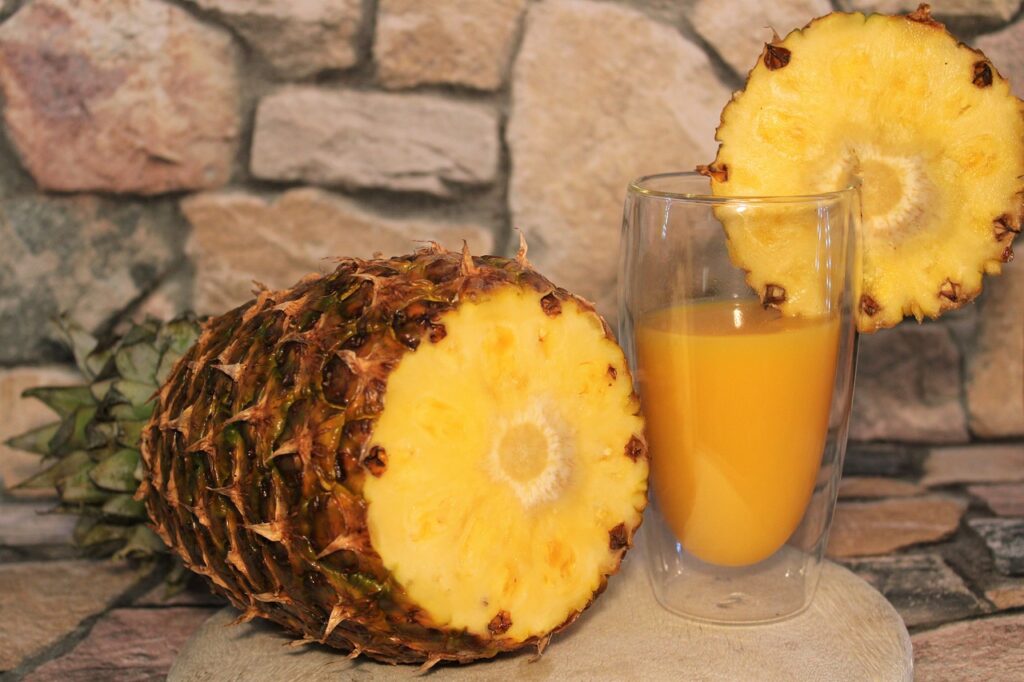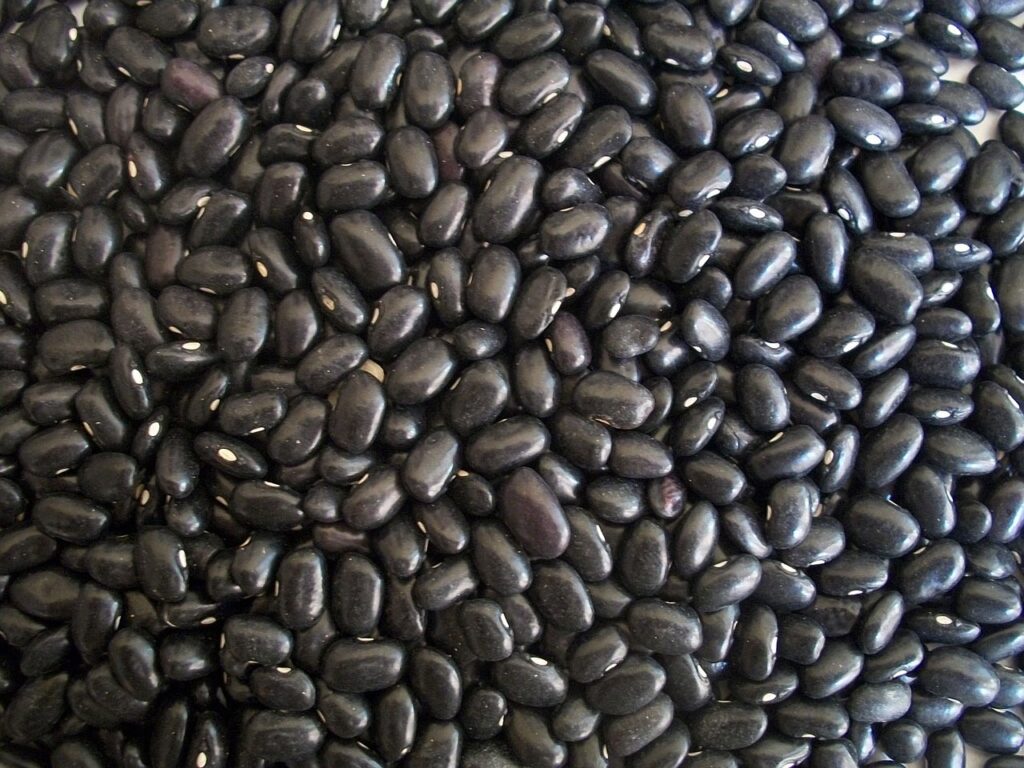Have you ever wondered why more and more people are opting for dairy-free keto milk alternatives?
Well, let's just say that there's a lot more to it than meets the eye.
While traditional milk may seem innocent enough, it can actually derail your keto journey in more ways than one.
But fear not, because in this discussion, we will uncover the hidden pitfalls of milk on a ketogenic diet and explore the enticing benefits of its dairy-free substitutes.
So, get ready to discover a whole new world of keto-friendly milk options that will keep you on track and leave you wanting more.
Benefits of Dairy-Free Keto Milk Alternatives
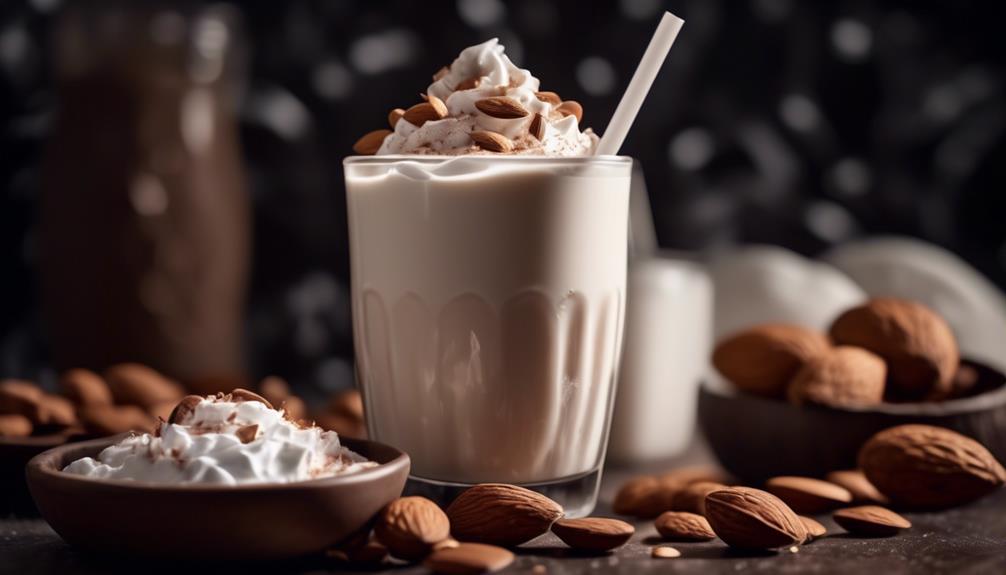
Dairy-free keto milk alternatives offer numerous benefits for individuals following a ketogenic diet. These alternatives are lower in net carbs compared to traditional milk, making them a suitable choice for those on a keto diet. By choosing dairy-free options, you can reduce your carbohydrate intake while still enjoying the creamy texture and taste of milk. Additionally, these alternatives are allergen-friendly, making them a great option for individuals with lactose intolerance, dairy allergies, or sensitivities.
Many dairy-free keto milk alternatives are plant-based, providing options for those who want to limit their animal product consumption. This isn't only beneficial for personal dietary preferences, but it also supports environmental sustainability. By choosing plant-based milk alternatives, you can contribute to reducing your carbon footprint.
Another advantage of dairy-free keto milk alternatives is their versatility in recipes. Whether you want to add milk to your coffee, make a creamy smoothie, or bake delicious goods, these alternatives can be used just like traditional milk. They provide the same texture and taste while being compatible with a ketogenic diet.
Moreover, some dairy-free keto milk alternatives offer additional health benefits. These options are often fortified with healthy fats, protein, and essential minerals, enhancing the nutritional profile of your keto-friendly diet. By incorporating these alternatives into your meals and snacks, you can ensure that you're getting a well-rounded and balanced diet.
Net Carbs in Milk and Keto
When following a keto diet, being mindful of the net carb content in milk is crucial. Traditional whole milk can contain a significant amount of net carbs, which can quickly add up and hinder your progress.
However, there are several keto-friendly milk alternatives, such as heavy cream, coconut milk, nut milk, and seed milk, that offer lower net carb options while still providing a creamy and nutritious substitute.
Milk Carb Content
To stay within your daily net carb limit on keto, it's important to be mindful of the carb content in milk. Here are some low-carb milk alternatives that can be suitable for a keto diet:
- Unsweetened almond milk: With only 1-2 grams of net carbs per cup, unsweetened almond milk is a popular keto milk option. It's also a good source of vitamin E and healthy fats.
- Unsweetened macadamia nut milk: Similar to almond milk, unsweetened macadamia nut milk is low in carbs, with around 1-2 grams of net carbs per cup. It has a creamy texture and is rich in monounsaturated fats.
- Pea milk: Made from yellow peas, pea milk is a plant-based option that contains around 2-3 grams of net carbs per cup. It's also a good source of protein.
- Coconut cream: Although not technically a milk, coconut cream is a high-fat, low-carb option that can be used in place of milk in keto recipes. It contains negligible amounts of carbs and adds a rich, creamy taste to dishes.
Remember to choose unsweetened options and read labels carefully to ensure minimal additives and artificial preservatives.
Keto-Friendly Milk Options
If you're following a keto diet, it's crucial to be mindful of the carb content in milk, as it can significantly impact your daily net carb limit.
Milk contains high amounts of lactose, which is broken down into simple sugars in the gut, making it unsuitable for keto due to its high carb content. Whole milk can have 11 grams of net carbs per cup, nearly half the daily net carb limit on keto, making it important to opt for low-carb alternatives.
Additionally, milk can cause sensitivity or allergies due to lactose and specific proteins, prompting the need for dairy-free keto milk options.
Thankfully, there are various keto-friendly milk substitutes to choose from, such as heavy cream, half & half, unsweetened coconut milk, various unsweetened nut and seed milks, unsweetened soy milk, and unsweetened pea protein milk.
These alternatives provide contextually relevant options for individuals following a dairy-free keto diet.
Benefits of Dairy-Free
Dairy-free milk alternatives offer a lower net carb content, making them a suitable choice for individuals following a keto diet. Here are some benefits of choosing dairy-free milk alternatives:
- Managing lactose sensitivity or allergies: Substituting milk with dairy-free options can help individuals who are lactose intolerant or have dairy allergies.
- Plant-based or vegan approach: Opting for dairy-free options supports a plant-based or vegan lifestyle, providing an alternative source of nutrients without animal products.
- Nutrient variety and flavors: Dairy-free keto milk alternatives come in a range of flavors and offer various nutrients, catering to diverse dietary preferences.
- Wider range of keto-friendly recipes: By using dairy-free alternatives, you can enjoy a wider range of recipes and beverages that fit into a low-carb, high-fat keto diet.
- Coconut milk: One popular dairy-free option is coconut milk, which is unsweetened and has a low carb content per cup.
Consider these benefits when choosing dairy-free milk alternatives for your keto diet.
Allergies and Sensitivities to Milk Proteins
If you experience allergies or sensitivities to milk proteins, it's important to find alternatives that suit your needs. Milk protein intolerance can lead to digestive issues, skin problems, and respiratory symptoms.
Protein Allergies and Sensitivities
Many individuals experience sensitivity or allergies to milk due to the presence of lactose and specific proteins. When you have protein allergies or sensitivities, it can be challenging to find suitable milk alternatives that are both dairy-free and keto-friendly.
However, there are options available that can meet your dietary needs. Consider the following milk alternatives:
- Heavy cream
- Half & half
- Unsweetened coconut milk
- Nut milk (almond, cashew, walnut, macadamia, hazelnut)
- Seed milk (flax, hemp)
These alternatives can be used in various recipes and can be made at home. When choosing a milk substitute, be mindful of the macronutrients to ensure it aligns with your keto goals. Avoid milk substitutes that are high in carbs or contain added sugars.
Milk Protein Intolerance
For individuals with protein allergies or sensitivities, milk protein intolerance can pose challenges when seeking dairy-free and keto-friendly milk alternatives. Milk protein intolerance is a condition where the body has difficulty digesting and tolerating the proteins found in milk. This can cause a range of symptoms, such as digestive issues, skin problems, or respiratory symptoms.
It's important to note that milk protein intolerance is different from lactose intolerance, which is the inability to digest lactose, a sugar found in milk. To manage milk protein intolerance, individuals may need to avoid milk and milk products altogether and opt for alternative milk options. Common milk protein allergens include casein and whey.
Thankfully, there are many dairy-free milk alternatives available that can be suitable for a keto diet, providing both nutrition and taste without the high-carb content of regular milk.
Dairy-Free Alternatives Benefits
Individuals with sensitivities or allergies to milk proteins can benefit from choosing dairy-free alternatives. Here are some reasons why:
- Dairy-free milk alternatives, such as coconut milk, are suitable for those with lactose intolerance or specific milk protein allergies.
- Opting for dairy-free alternatives helps avoid potential digestive discomfort or allergic reactions caused by milk proteins.
- For individuals following a keto diet, dairy-free milk alternatives offer lower net carb content, making it easier to stay within daily carb limits.
- Choosing dairy-free milk substitutes also provides an opportunity to limit animal product consumption, aligning with certain dietary preferences or ethical considerations.
- Dairy-free keto milk alternatives ensure that individuals can still enjoy creamy and flavorful options that are compatible with their dietary needs and lifestyle choices.
Avoiding Animal Products on Keto
To adhere to a keto diet while avoiding animal products, consider incorporating dairy-free milk alternatives into your meal plan. Unsweetened soy milk, oat milk, flax milk, coconut milk, almond milk, and macadamia nut milk are all suitable options for those looking to avoid milk on a keto diet. These alternatives can help manage lactose sensitivity, allergies, and limit animal product consumption.
Unsweetened soy milk is made from soybeans, which are naturally low in carbohydrates and high in protein. Oat milk, on the other hand, is made from oats and provides a creamy texture without the lactose found in cow's milk. Flax milk is made from flaxseeds and is an excellent source of omega-3 fatty acids. Coconut milk, derived from coconuts, is rich and creamy, making it a popular choice for dairy-free keto diets. Almond milk and macadamia nut milk are made from nuts and are low in carbs, making them suitable options for those following a keto diet.
When using these milk alternatives in recipes, it's important to choose unsweetened options and track your macronutrients for accurate keto tracking. Avoid sweetened alternatives, high-carb options, and those with non-keto-friendly ingredients to stay true to your dietary goals.
Non-Dairy Keto Milk Substitutes
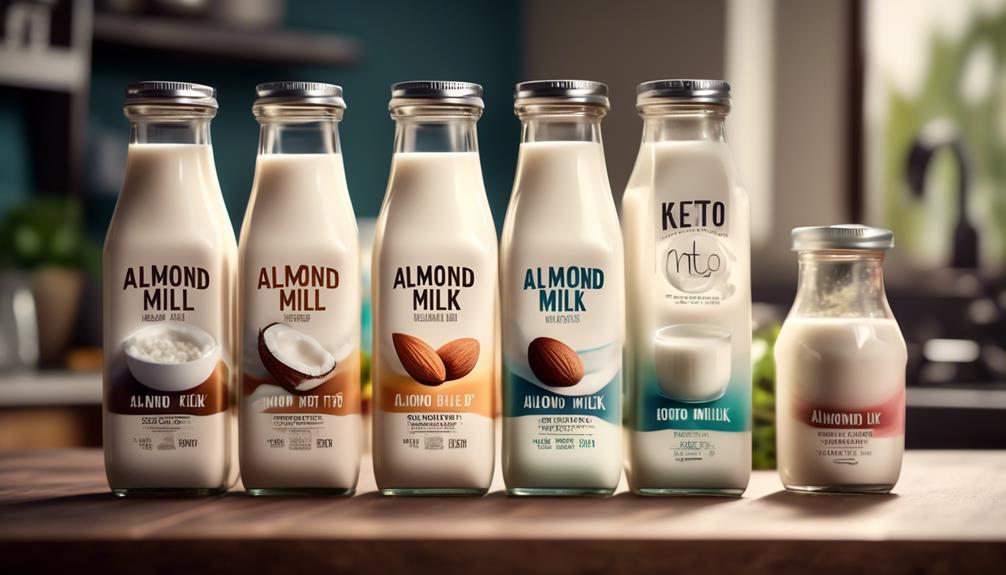
Looking for dairy-free options on your keto diet? Non-dairy milk substitutes can be a great choice.
Unsweetened coconut milk, nut milk, seed milk, soy milk, and pea protein milk are all low in carbs and suitable for those with dairy, nut, and soy allergies.
These alternatives provide a range of options for those following a keto lifestyle while still enjoying a creamy beverage.
Health Benefits of Dairy-Free
One of the key advantages of incorporating dairy-free keto milk substitutes into your diet is their low net carb content compared to traditional milk.
Here are some health benefits of choosing non-dairy alternatives:
- Carbohydrate Management: Dairy-free keto milk substitutes help manage carbohydrate intake as they're low in net carbs.
- Digestive Comfort: Non-dairy milk alternatives are suitable for individuals with lactose intolerance or dairy allergies, providing a more comfortable digestive experience.
- Plant-Based Lifestyle: Choosing dairy-free options supports a plant-based or vegan lifestyle while reducing overall animal product consumption.
- Nutrient-Dense Options: Non-dairy keto milk substitutes offer a wide variety of nutrient-dense options, such as almond, coconut, and macadamia nut milk, contributing to a diverse and balanced diet.
- Purity and Naturalness: Opting for homemade keto-friendly nut or seed milk allows individuals to avoid additives and preservatives, ensuring a purer and more natural milk alternative.
Incorporating dairy-free keto milk alternatives provides not only a way to manage carbohydrate intake but also offers various health benefits for those following a keto diet or seeking alternatives to traditional dairy milk.
Popular Keto Milk Alternatives
When it comes to finding dairy-free alternatives for a keto diet, there are several popular options that can be used as substitutes for traditional milk. Some of the most commonly used milk substitutes include coconut milk, unsweetened nut milk, unsweetened seed milk, unsweetened soy milk, and unsweetened pea protein milk. These alternatives are low in net carbs and high in fat, making them suitable for a keto diet.
Additionally, you can also make your own homemade keto-friendly milk substitutes using nuts or seeds such as almonds, cashews, walnuts, macadamia, hazelnuts, flax, and hemp. When using these milk substitutes in recipes, it's recommended to use heavy cream or half & half as a 1:1 substitute and track the macronutrients for accurate keto tracking.
It's important to avoid sweetened milk alternatives with added sugars, high-carb milk substitutes, and non-dairy creamers with added sugars or artificial ingredients. Some popular non-dairy milk alternatives for keto include almond milk, coconut milk, macadamia nut milk, flax milk, soy milk, and pea protein milk, each with their own unique characteristics and nutritional profiles suitable for a keto diet.
Making Homemade Keto Nut Milk
To make homemade keto nut milk, begin by soaking 1 cup of raw nuts overnight. This process helps to soften the nuts and makes them easier to blend. Once the nuts have soaked, you can follow these steps to make your own homemade keto nut milk:
- Blend soaked nuts with 4 cups of filtered water until smooth. This creates a creamy base for your nut milk.
- Drain the mixture through a muslin cloth or nut bag to separate the milk from the pulp. This step ensures a smooth and silky texture for your nut milk.
- Squeeze out the milk from the pulp, making sure to extract as much liquid as possible. This will give you a higher yield of nut milk.
- Enjoy your homemade keto nut milk immediately or store it in an airtight container in the refrigerator for up to 4-5 days. This allows you to have a delicious and nutritious dairy-free alternative whenever you need it.
- Don't forget about the leftover pulp! It can be used in low-carb recipes as a bonus ingredient, adding flavor and texture to your dishes.
Making homemade keto nut milk is a great way to enjoy a dairy-free, low-carb, and high-fat beverage. It allows you to control the ingredients and avoid any unwanted additives or preservatives. Plus, with options like almond, cashew, or macadamia nuts, you can choose the nut that suits your taste preferences.
Making Homemade Keto Seed Milk
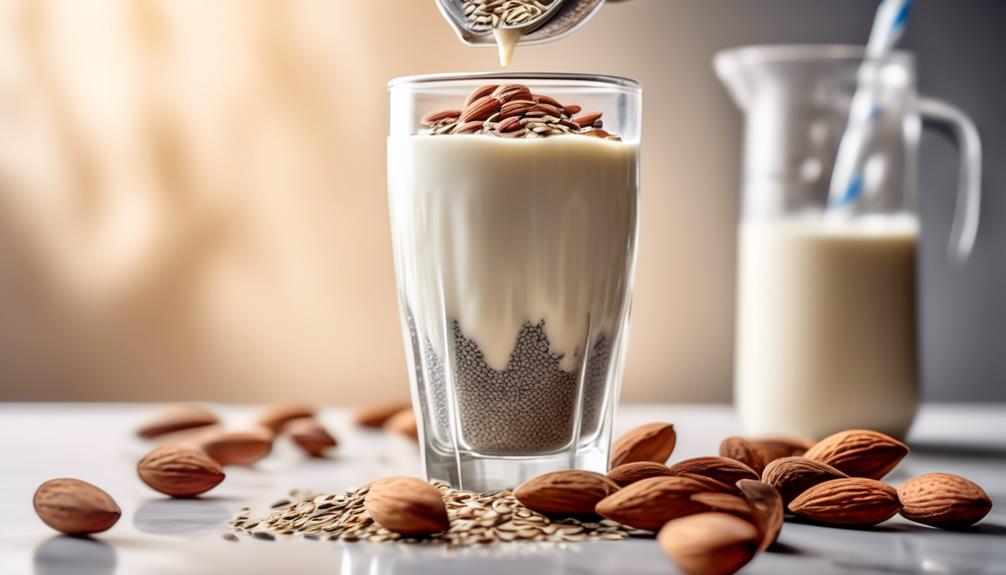
If you're looking for a dairy-free, low-carb alternative to traditional milk, making homemade keto seed milk is a great option.
By blending flax or hemp seeds with water and straining the mixture, you can create a nutritious and delicious milk substitute.
Not only does homemade seed milk offer control over the ingredients and macronutrient content, but it also provides various nutritional benefits.
Nutritional Benefits of Seed Milk
Making your own homemade keto seed milk offers a nutritious and dairy-free alternative to traditional milk, perfect for those following a keto diet. Here are some nutritional benefits of seed milk:
- Low in net carbs: Homemade seed milk, like flax or hemp, provides a low-carb option for those adhering to a keto diet.
- Rich in omega-3 fatty acids: Seed milk is a great source of omega-3 fatty acids, which are essential for heart and brain health.
- Control over ingredients: Making your own seed milk allows you to ensure it's free from added sugars or unwanted additives.
- Dairy-free option: Seed milk is suitable for individuals with lactose intolerance or those following a vegan or dairy-free diet.
- Plant-based protein and fiber: Incorporating homemade seed milk into your diet provides a source of plant-based protein, fiber, and essential minerals, supporting overall health and well-being.
Easy Homemade Seed Milk Recipes
For an easy and nutritious dairy-free milk alternative that fits perfectly into a keto diet, try making your own homemade seed milk. By creating your own seed milk, you have full control over the ingredients and can customize flavors to your liking.
There are various seed milk recipes to choose from, such as using organic coconut milk or canned coconut milk as a base. Other options include Milkadamia unsweetened macadamia milk, Good Karma Unsweetened Flaxmilk, or unsweetened coconut milk. These recipes provide a low-carb and nutrient-rich option for those following a keto diet.
Making homemade keto seed milk isn't only cost-effective, but it also allows you to tailor the milk to your individual dietary preferences and allergies. Incorporating homemade seed milk into various recipes and beverages enhances the versatility of a keto diet.
Flavoring Options for Homemade Nut or Seed Milk
Enhance the natural flavors of your homemade nut or seed milk by adding a pinch of salt. This simple addition can help to bring out the inherent taste of the nuts or seeds you're using. However, if you want to further customize the flavor of your milk, there are several options available to you.
Here are some flavoring options to consider for your homemade nut or seed milk:
- Sweeten your milk with keto-friendly sweeteners like stevia, erythritol, or monk fruit. These alternatives can provide a touch of sweetness without adding unnecessary carbs or calories.
- Add a dash of vanilla extract for a subtle and aromatic flavor in your nut or seed milk. This can give your milk a comforting and familiar taste.
- Experiment with flavorings like cinnamon, nutmeg, or cocoa powder to customize the taste of your milk. These spices can add depth and complexity to your homemade creation.
- Infuse your nut or seed milk with a hint of almond, coconut, or hazelnut extract for a unique flavor profile. This can mimic the taste of popular store-bought milk alternatives like almond milk or coconut milk.
Replacing Milk With Keto Milk Substitutes
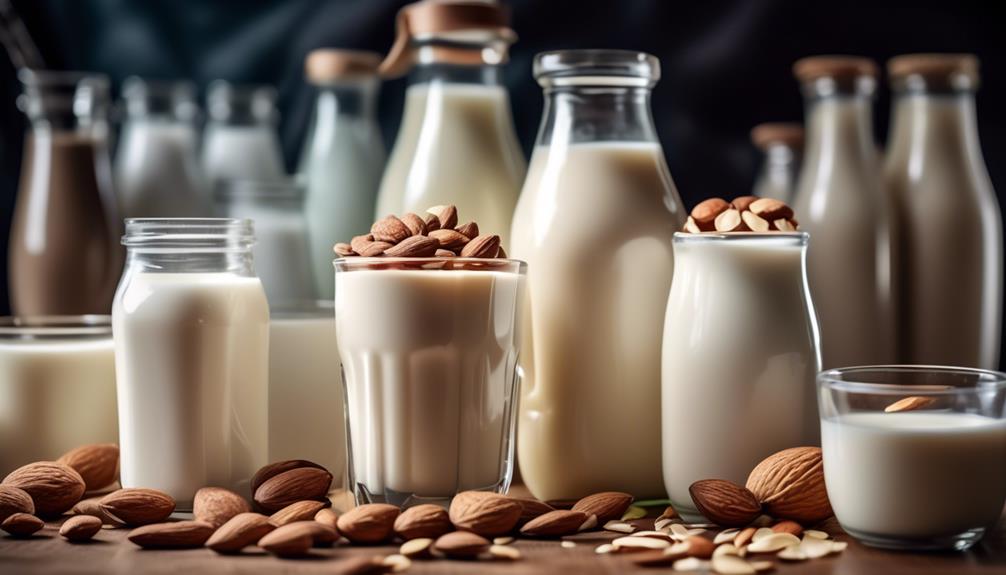
Consider switching out traditional milk for dairy-free keto milk substitutes to reduce your intake of lactose and net carbs. Milk contains high amounts of lactose, which is broken down into simple sugars in the gut, making it high in net carbs.
For those with lactose sensitivity or following a keto diet, dairy-free options like unsweetened coconut milk offer a low-carb alternative. Homemade keto-friendly nut milk is another customizable option that's low in carbs.
When replacing milk in recipes, it's important to choose alternatives that mirror the fat content and track the macronutrients accurately. Unsweetened nut milk, seed milk, or heavy cream can be used as substitutes.
Among the top choices for a low-carb, dairy-free option on keto are unsweetened almond milk, coconut milk, or macadamia nut milk. These alternatives provide the creaminess and flavor without the lactose and high carb content of traditional milk.
Coconut Milk and Almond Milk Substitutes
To continue exploring dairy-free keto milk substitutes, let's now focus on the versatility of coconut milk and almond milk as excellent alternatives. These two options aren't only low-carb but also dairy-free, making them perfect for a keto diet.
Here are some facts about coconut milk and almond milk substitutes:
- Homemade keto nut milk: You can easily prepare your own keto-friendly nut milk by soaking raw nuts overnight and blending them with filtered water. This allows you to control the ingredients and avoid added sugars commonly found in store-bought options.
- Heavy cream or half & half substitutes: If a recipe calls for milk, you can use heavy cream or half & half as a 1:1 substitute. These options are high in fat and low in carbs, making them suitable for a keto diet.
- Almond milk: Almond milk is a popular choice for its low-carb content. It's made by blending almonds with water and straining the mixture. Unsweetened almond milk is an excellent option for those following a keto diet.
- Unsweetened coconut milk: Unsweetened coconut milk is another fantastic keto-friendly option. It has a creamy texture and can be used in various culinary applications, such as smoothies, curries, and baking.
- Choosing the right milk substitutes: When selecting milk alternatives for a keto diet, it's crucial to avoid high-carb options and opt for unsweetened, low-carb alternatives like almond milk, coconut milk, and macadamia nut milk.
These dairy-free keto milk substitutes provide you with a variety of options to enjoy while staying on track with your keto lifestyle.
Milk Alternatives to Avoid on Keto
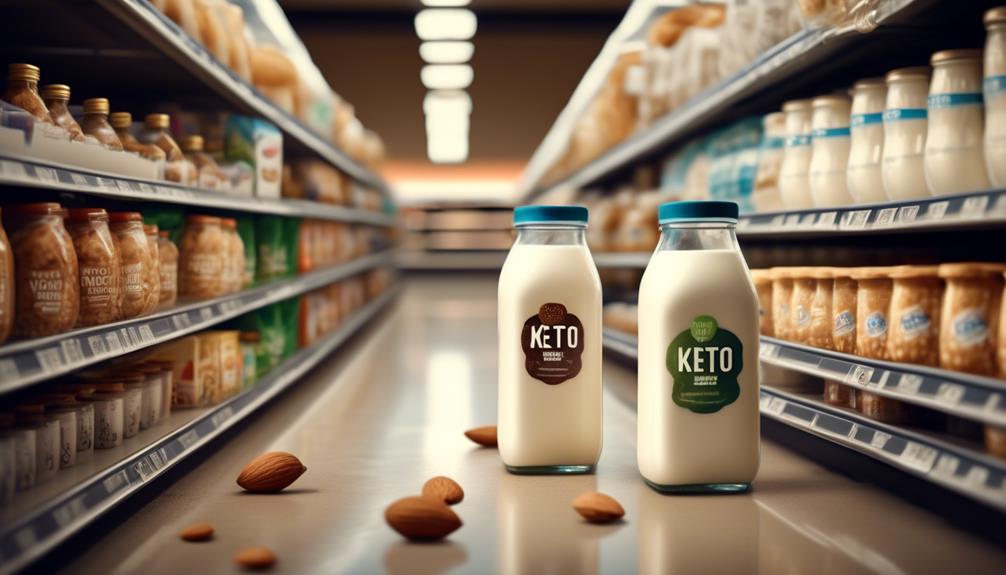
Avoid milk alternatives on the keto diet that contain added sugars, have high net carb counts, or include non-keto-friendly ingredients. These milk alternatives can hinder your progress and prevent you from reaching your health goals.
When it comes to coconut milk, almond milk, macadamia nut milk, flaxseed milk, goat's milk, and rice milk, it's important to choose wisely.
Coconut milk and almond milk are popular choices for those following a keto lifestyle. However, it's crucial to opt for unsweetened versions to avoid added sugars. Some brands may also add thickeners or preservatives that aren't keto-friendly, so make sure to read the labels carefully.
Macadamia nut milk is another option to consider. It has a creamy texture and a rich flavor, making it a great addition to your keto recipes. Look for unsweetened varieties with minimal ingredients to stay on track with your carb intake.
Flaxseed milk is a low-carb alternative that's rich in omega-3 fatty acids. It can be a good choice for those looking to boost their fat intake on the keto diet. However, be cautious of flavored versions that may contain added sugars.
Goat's milk is higher in fat and lower in lactose compared to cow's milk, making it a potentially suitable option for some individuals on the keto diet. However, it's essential to check the carb content and choose unsweetened versions.
Lastly, rice milk should be avoided on the keto diet due to its high carb content. It's made from rice grains, which are high in starch and can significantly impact your carb intake.
Low-Carb Substitutes for Evaporated Milk and Sweetened Condensed Milk
For a low-carb alternative to evaporated milk and sweetened condensed milk, consider using low-carb milk substitutes that align with keto dietary restrictions. Here are five options to consider:
- Coconut milk: Coconut milk is a creamy and flavorful dairy-free milk substitute that works well in both sweet and savory dishes. It's low in carbs and high in healthy fats, making it a great choice for those following a keto diet.
- Almond milk: Almond milk is another popular dairy-free milk substitute that's low in carbs and keto-friendly. It's made from ground almonds and water, providing a mild, nutty flavor.
- Macadamia nut milk: Macadamia nut milk is a rich and creamy milk alternative that's low in carbs and high in healthy fats. It has a smooth texture and a slightly sweet taste, making it a delicious option for keto-friendly recipes.
- Flaxseed milk: Flaxseed milk is a nutritious and low-carb milk substitute that's made from ground flaxseeds and water. It's high in omega-3 fatty acids and fiber, making it a healthy choice for those following a keto diet.
- Dairy-free heavy cream: Dairy-free heavy cream is a rich and decadent milk substitute that's perfect for keto recipes that require a thick and creamy texture. It's low in carbs and provides a luxurious mouthfeel to dishes.
Best Keto-Friendly Milk Alternatives
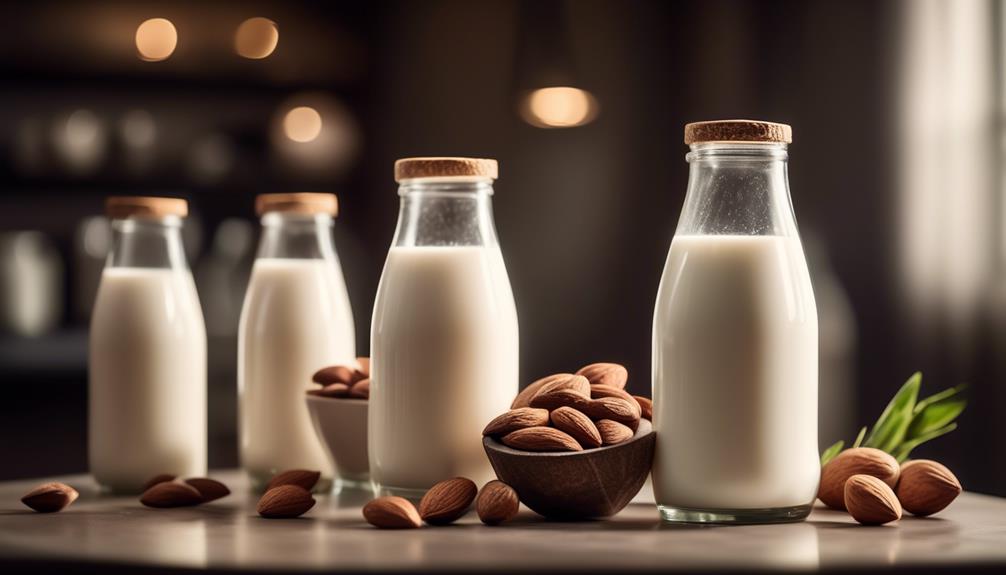
Consider incorporating keto-friendly milk alternatives into your diet to satisfy your dairy cravings without compromising your low-carb lifestyle. Milk is high in lactose, which breaks down into sugars in the gut, making it unsuitable for a keto diet. Luckily, there are several options available that are both delicious and compatible with a keto-friendly eating plan.
One excellent choice is unsweetened coconut milk. It's high in healthy fats and low in carbs, making it an ideal milk alternative for those following a keto diet. Additionally, various nut milks, such as almond milk, cashew milk, and macadamia nut milk, are suitable options. These alternatives offer a creamy texture and are often fortified with essential vitamins and minerals.
Seed milks, such as hemp milk and flax milk, are also low in carbs and high in healthy fats. They provide a unique flavor profile and can be a great addition to your keto meal plan. Soy milk and pea protein milk are additional options for those looking for a dairy-free milk alternative that fits within their keto lifestyle.
When using milk substitutes in recipes, opt for heavy cream or unsweetened coconut milk to match the high-fat content necessary for accurate keto tracking. Remember to avoid sweetened milk alternatives and high-carb options to ensure you stay on track with your low-carb goals.
With these keto-friendly milk alternatives, you can enjoy the taste and texture of milk without compromising your dietary goals.
Oat Milk and Other Dairy-Free Alternatives on Keto
To maintain your keto diet while enjoying a creamy and slightly sweet milk alternative, oat milk can be substituted with low-carb options like almond milk or coconut milk. Here are some other dairy-free alternatives you can choose from on a keto diet:
- Heavy cream: With its high fat content and low carbohydrates, heavy cream is a suitable option for adding richness to your coffee or recipes.
- Unsweetened coconut milk: Coconut milk is a creamy and flavorful alternative that's low in carbs and high in healthy fats.
- Nut milk (almond, cashew, walnut, macadamia, hazelnut): These plant-based milks are low in carbs and provide a good source of healthy fats. They can be easily made at home for a personalized touch.
- Seed milk (flax, hemp): Seed milks are low in carbs and rich in omega-3 fatty acids. They can be a great option for those with nut allergies.
- Soy milk: While soy milk is higher in carbs compared to other options, it can still be included in moderation on a keto diet.
When choosing dairy-free alternatives on keto, it's important to consider the carb content, suitability for dairy allergies, and how well the substitute mirrors the fat content of regular milk in recipes. By exploring these options, you can find a delicious and satisfying milk alternative that aligns with your keto lifestyle.
Conclusion
In conclusion, choosing dairy-free keto milk alternatives provides numerous benefits for those following a ketogenic diet. By opting for alternatives like heavy cream, unsweetened coconut milk, or nut milk, individuals can enjoy their favorite recipes while staying within their keto macros.
These alternatives help to reduce carb intake, avoid sensitivities or allergies to milk proteins, and allow for the avoidance of animal products on keto. With a wide range of options available, individuals can find the best keto-friendly milk alternative to suit their needs.

